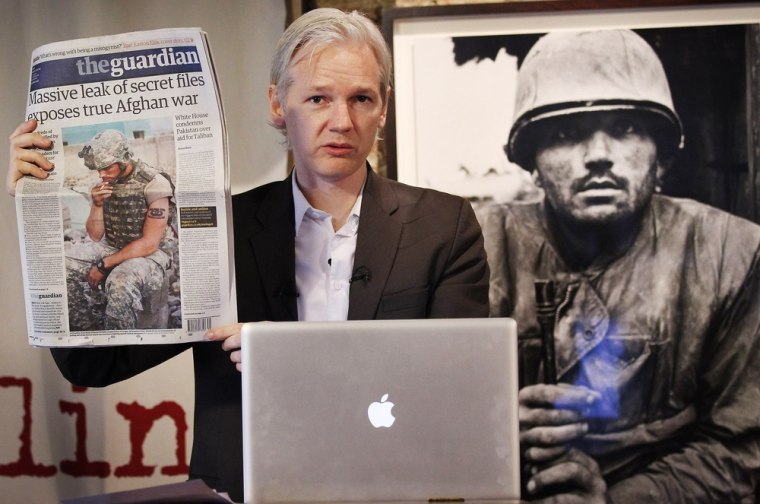An ongoing Pentagon review of the massive flood of secret documents made public by the WikiLeaks website has so far found no evidence that the disclosure harmed U.S. national security or endangered American troops in the field, a Pentagon official told NBC News on Monday.
The initial Pentagon assessment is far less dramatic than initial statements from the Obama White House Sunday night after three major news organizations – The New York Times, the Guardian and Der Spiegel — published what was touted as an unprecedented “secret archive” of classified military documents relating to the war in Afghanistan. The documents appear to show, among other matters, close collaboration between elements of the Pakistani intelligence service and the Taliban — an awkward issue that U.S. intelligence officials have strenuously complained about for some time but are loath to talk about publicly.
The news organizations said they received the documents from WikiLeaks, a controversial website that specializes in soliciting and publishing sensitive government documents. No sooner did the stories appear this weekend than U.S. National Security Adviser James Jones “strongly” condemned the WikiLeaks disclosure, saying that the trove of classified documents “could put the lives of American and our partners at risk and threaten our national security.”
But David Lapan, deputy assistant secretary of defense for media operations, told NBC News on Monday that a preliminary review by a Pentagon “assessment” team has so far not identified any documents whose release could damage national security. Moreover, he said, none of the documents reviewed so far carries a classification level above “secret” — the lowest category of intelligence material in terms of sensitivity.
The review team — consisting of military intelligence analysts, lawyers and others working for the Joint Chiefs of Staffs and other elements of the Defense Department — is examining the Wikileaks material to determine whether the disclosures endanger U.S. troops in the field, harm U.S. national security or compromise sources and methods for intelligence gathering.
While the team so far has not found any that would meet any of those criteria, Lapan noted that WikiLeaks has yet to publish all the documents it claims to have. Moreover, the Pentagon review has been stymied by the fact that, for at least part of the day Monday, the military team was unable to access WikiLeaks.org — apparently because of the heavy traffic it was receiving. In effect, the Pentagon analysts were unable to read classified government documents that had already been posted and read by the general public around the world.
The disclosure came as a spokesman for WikiLeaks said the international organization has no idea who provided the classified material to the organization through its website. There has been considerable speculation that the material had been provided by Pfc. Bradley Manning, the U.S. soldier arrested in Baghdad last month after boasting that he had leaked a video showing a U.S. military strike that killed civilians in Iraq. Manning also said that he had provided WikiLeaks of other classified military documents.
John Farrell, a spokesman for WikiLeaks in London, said that if Manning was in fact the source of the documents, “then we believe him to be an international hero.”
